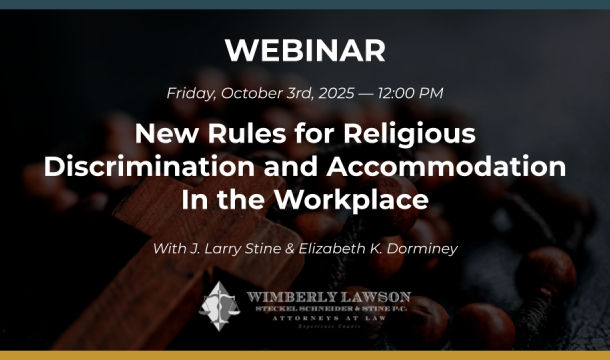Host Thom Jennings and resident expert and attorney Kathleen Jennings discuss when and why employees will record conversations in the workplace. Thom shares a story about when he used a recorded conversation to win an unemployment case, and Kathleen discusses the time when she handled a case involving erotic baked goods.
Podcast Episode Transcription
Narrator (00:03):
You are listening to Cover Your Assets, a podcast that discusses the timely and significant legal issues faced by employers. Kathleen Jennings is an attorney who has over 30 years of experience in advising employers as to their legal responsibilities and has written extensively about employment law in our popular Cover, your Assets blog. If your business has employees you cannot afford not to have your assets covered.
Thom Jennings (00:32):
Hello everyone and welcome to Cover Your Assets, the Labor and Employment Law Podcast. And as always, we want to thank you for listening and we would encourage you to share this with your friends, anybody that might find the information in these podcasts relevant and or helpful. And of course, reviews always help us to grow the podcast as well. And this week, as in every week, we have our special wonderful expert attorney, and her name is Kathleen Jennings. It's, it's amazing, you and I have the same last name. Is that is that a coincidence or not?
Kathleen Jennings (01:10):
I think it's not a coincidence because believe it or not, we are related. So yes, we do have the same last name.
Thom Jennings (01:17):
Now, this conversation that you and I are having is indeed being recorded.
Kathleen Jennings (01:23):
Yes, it is. With, with both of our permission believe with
Thom Jennings (01:26):
Both, both of our permission. That is correct. And actually, the topic today is recording of conversations. And I think that this is an important topic on many levels because, well, first of all, laws differ from state to state in terms of what I mean the term, I believe the legal term is and near the attorney is consent, right?
Kathleen Jennings (01:50):
Well, you have, yeah. There's some states where all you need is one person consent, and that's the majority of the states, which means that one person to the conversation consents to having the conversation being recorded. In other words, if I'm in a conversation with two other people and I know it's being recorded, then that's okay. You cannot, however, record a conversation that you're not a party to in the one consent states, you still have to be at least a party to the conversation. So you can't stick your phone under a, under a door and leave it there to try to listen to a con or record a conversation that you're not a part of that would not be legal under those laws. And then you have some states about 10 or 11 states have a two-person consent, and that means that both parties to the conversation must consent to the recording or else the recording is in violation of law.
Thom Jennings (02:51):
And I, I think this is an important thing that we should discuss as well is, is if we're, you're talking about two different states, which state actually has the law that trump's the other one. So if I'm, I'm in New York, which I believe is a one-party consent state, but I'm calling somebody in a, in a state that is a two-party consent state is which, which law applies.
Kathleen Jennings (03:14):
Well, in that case, you also start looking at federal telecommunication laws. So it would depend on the circumstances. I could not give you a definitive answer sitting here right now. That's why you need to talk to your attorney before you do these things. So you make sure that you don't run a foul of any state or federal laws.
Thom Jennings (03:40):
A foul is a fantastic term, by the way. We would never want a foul. We would never run to run a fowl. It's like if you had a, if you had a duck somewhere and you made it run, that would, you would be, you'd be running a fowl, is that correct?
Kathleen Jennings (03:53):
Or a, a chicken yes, A chicken. In fact, having just seen little feet performed this past weekend, we could include a Dixie chicken as a foul.
Thom Jennings (04:06):
So a foul aside, let's, let's talk about again, what would motivate an employee to record a conversation. So and again, the presumption of the fact that a conversation is being recorded. So let me reframe that question a little bit. In what situation would a, would an employee likely either start recording a conversation or what types of conversations are more often recorded than others?
Kathleen Jennings (04:36):
So many different situations? Thom, I've been practicing law long enough that I remember back in the days when people wanted to record conversations, they couldn't do it with a phone. They had to actually go out and buy a micro-cassette recorder and use that to record conversations. So I had a case over 20 years ago where a woman had a micro cassette recorder in an envelope on the top of her desk, and she used that to record various conversations in the workplace because she was concerned that she was going to lose her job. And she worked in a workplace where there was a lot of dirty jokes being told on a regular basis. This was the kind of workplace where it was customary to have cakes brought in for office parties from a place called the Erotic Bakery. So you can imagine what shapes those cakes took on. And this woman was a willing participant in all of these parties and all of these conversations. But she was smart enough to know that if she had them on tape, she could use them against her employer, her supervisor, or various people in the workplace. And that would essentially protect her from being terminated. And as a bonus, pretty much embarrassed the people that she worked with because this was a public agency.
Thom Jennings (06:10):
And, and, you know, I, I think that it's important too that when we talk about it you said, oh, cause she's a willing participant, you know, fine. And I think, I think there is all, there's a societal disgust maybe sometimes when people are recording conversations without everybody's consent in the room. But whether or not you get offended that somebody has recorded your conversation, they can't record you doing something illegal if you're not doing anything illegal. So in that case, like I said, you've got the erotic bakery stuff, which may seem all fine and Danny and everybody in the office is, is good to go with it. But like you said, I think, I think again, the other point that's important in looking at the theme of our podcast, which is cover your assets the best way to cover your assets is not to do things at any point that if they were recorded could result in damaging information being leaked out to the public, or eventually go into a lawsuit. And I assume there was a lawsuit involved, otherwise you wouldn't be talking about that case.
Kathleen Jennings (07:11):
There was, there was, and I, it was resolved for a great deal of money, and I think some people at the top probably lost their jobs too. So it's all fun and games until the, the erotic bakery cake comes out. And, you know, you snap a photo of that combined with recordings of people telling dirty jokes. And keep in mind, the person who's making the recording or who has the secret recorder, is not going to be using the language that everybody else is because she knows that it's being recorded. So she comes off sounding like a nun and everybody else comes off sounding like they're hanging out at a, an adult entertainment venue more or less. So yeah, that's a situation where someone will start recording conversations in the workplace anytime anybody thinks that they are in performance trouble and or, or even if you also have a situation where if there is sexual harassment going on in the workplace and the person has reported it and they feel like nobody believes them, then the next step is to get a recording of the sexual harassment. And you have that as proof, and that's pretty strong proof if, if that is in fact what is on the recording.
Thom Jennings (08:41):
Yeah, and I mean, not only sexual harassment, I mean, one of the reasons we chose this topic is because I live in a town in western New York, and there was recently a story in the Move News where there was a gentleman who is the supervisor of a small town near Buffalo, and he had conversations that were recorded where he was calling employees the F word followed by the C word. And so the effing Cs and naming employees by name, this is all recorded. And then in, in, in addition to disparaging employees, he used a racial slur that begins with the letter N and he was you know, his defense in public, of course was, oh, you know, people say this stuff. I know we've, we've, we've heard it in the news where other people have been caught saying things that they shouldn't say. And it's like, well, you know, people talk like this, but if you're talking like that, chances are, like you said, if somebody's out to get you, they're probably gonna start recording it. And that's exactly what happened in this case.
Kathleen Jennings (09:45):
One of the things that I tell supervisors and managers when I conduct training is, number one don't put a target on your back. Don't say or do anything in the workplace that could be taken out of context even and used against you. And number two, assume that you are being recorded at all times. Because right now, pretty much everybody has a smartphone and everybody can record both audio and video from their smartphone. And so you have to protect yourself and assume that you are being recorded at all times, especially when it comes to employee meetings, disciplinary meetings situations like that where an employee is going to want to have evidence of what happened.
Thom Jennings (10:41):
Yeah, and, and like you said, it's just, it's not, it's just not that difficult. It, I mean, there was a period of time where you had to, to put in some effort and get a recorder and maybe a microphone and worry about placement and things like that. I mean, with an iPhone, you would literally just have to put it on the desk in front of you and hit record before you put it on the desk. So I, and, and I wonder like if there is a situation with an employee, let's say they put the phone on the desk before the meeting, would you as an employer have a right to say can I see your phone, or could you please put your phone away before we have this meeting?
Kathleen Jennings (11:15):
Absolutely. You would have the right to say, you could even ask the employee not to bring the phone into the meeting. You can ask the employee, are you recording this meeting? Are you recording this conversation? If you are, I'm asking you to stop right now. Or in some cases I've seen employers, if the employee puts down their phone to record the conversation, then the supervisor or manager or human resource person will take out their phone and they'll record the same thing. And that way you can't have any of the recordings be doctored or edited or anything like that. So that's one way of handling that situation. Make your own recording when the employee's making their recording or have a rule, no recordings at all.
Thom Jennings (12:05):
So if an employer says to an employee or there's a policy that states specifically no recording in the workplace, is that an enforceable policy? I mean, it are, are because yes, if, if you think about it, I mean, why wouldn't every employer just have that policy and have it posted everywhere so that they wouldn't have to run into these types of situations?
Kathleen Jennings (12:29):
A lot of employers have that kind of policy, but having the policy and enforcing the policy are two different things. And I will say as a caveat to having the policy, one of the areas of law that you have to be mindful of is the National Labor Relations Act, because they have addressed the issue of whether employers can have no recording rules, as you know, whether this is considered protected concerted activity under the National Labor Relations Act. Right now, those policies are lawful, but because the N L R B changes it's composition, whenever there's a new administration that's always subject to change. So that's one of those areas where if you enact one of these policies, do check on the law to make sure the most up-to-date law to make sure that your policy is still lawful. So you can have the policy, if you catch an employee violating the policy, you can discipline the employee. Where you could run into problems is if you have an employee who is recording, for example, sexual harassment, and they come forward and they have a recording of sexual harassment because they're complaining of harassment. Well, yes, they violated your policy against recording, but they're also engaging in what would be considered a protected activity that would protect them from retaliation. So you have that tension between the workplace rule and the federal law that protects that kind of complaint about workplace sexual harassment.
Thom Jennings (14:22):
And, and I think that is incredibly important because what you're saying is that the policy can't necessarily protect you from illegal activity. So if there is a policy that states you cannot record in the workplace, but an employee does manage to, to do it, the worst case scenario, it's policy violation. You may be able to fire them for, for breaking the policy, but that doesn't change the fact that they have recorded something which could be considered criminal or, you know, again, much, much more serious than them just getting fired for making a recording. So going back to the original advice, you always have to act like your conversation is being recorded in the workplace, because it could be very easily
Kathleen Jennings (15:10):
It pro it may be. Yes, absolutely. Well, Thom, haven't you maybe recorded your share of conversations over the years?
Thom Jennings (15:20):
<Laugh>, I have recorded more work conversations than I care to to address. And, and you know, the reason I do is because it all comes back to sort of this whole podcasting thing too, is that I've done interviews with musicians for many years and my part-time job as a newspaper columnist, so I, I had recording equipment, so if there was a conversation that came up and I needed to record it, it was very easy for me. I had even pre-cellphone, I had a, a really, really good microphone that could record conversations that were just absolutely crystal clear. And but there was one occasion where I, where I was able to use that. And I think we actually discussed that in a previous episode. Did we not
Kathleen Jennings (16:05):
Do tell <laugh>? I I mean, you, you've had so many colorful experiences. Let me, let me ask you this question. Yes. Then as the employee who recorded the conversations, what was your motivation for making the recordings?
Thom Jennings (16:21):
Self-Preservation? A hundred percent. I mean, it was a situation where you could cer, you could sense that there were some things coming down the road and you needed some kind of protection. W many topics that we've, we've discussed through this podcast, constructive discharge is that, you know, when, when you start the process of trying to get rid of an employee, employees are not stupid. They sense it, they have a feeling, there's, there's sort of a tension in the air. And and those are the cases again, where, what's a basic human response, it's it's fight or flight. And part of that fight is you wanna make sure that you gather any evidence. If you indeed are as an employee being mistreated or people are saying things to you, then you have to do something to protect yourself. Or at the end of the day, if you're gonna try to defend yourself and you don't have the evidence to support it you get yourself into some trouble.
Thom Jennings (17:13):
Now, I had a situation that before I ever really recorded a conversation at work, which we may or may not have discussed, where an employer was engaging in illegal activity in terms of, of doctoring documents that were being submitted to the government for billing. And all of us were brought in and, you know, we, we, we forged these documents and I had proof of it in written form and I turned all of it over to our compliance officer, and then it was never seen again. And then I was driven outta the company and, and so forth. So whatever evidence I had was gone. So in the future, when I felt that I was under fire, like I did, did at at another agency where I knew that that things were coming down the road the conversation that actually helped me was, was the HR person and HR people, if you're listening, if you're calling an employee, it's just as easy to record a phone conversation as it is an in-person conversation.
Thom Jennings (18:06):
And I was suspended without pay and I had specifically asked the HR person if during this period of, of suspension and investigation, if I was going to still have my health insurance or if they were gonna have to bill me for my health insurance so that I would actually have a negative paycheck. And he said, well, likely you'll have a negative paycheck. And I said, well, then I'm gonna need to withdraw money out of my 401k, or at least borrow against it. He said, well, you can't do that while you're under an unpaid suspension. And so subsequently I said, well then how am I gonna get the money? I said, well, then you're gonna have to resign your position. That's the only way that you can get your money. Now, when we went for unemployment, we we had a hearing first hearing was just a quick phone hearing.
Thom Jennings (18:53):
They ruled into favor of the employer. I employer, I appealed it. We actually got in front of a judge who listened. And at one point during the hearing, I had said, well, I couldn't, I couldn't work. I, the reason I quit was because I was told that the only way that I could get money to pay my bills or even have health insurance or anything, was that I, that I had to resign because this suspension investigation would, could take, you know, a month or whatever. And the judge asked the employer's attorney, actually, cuz they had an attorney, and I didn't, which, you know, I mean, I'm sure you know, as an attorney, having an employee successfully argue against an attorney is, is pretty rare. But I stated that it's,
Kathleen Jennings (19:35):
It's probably in your genes
Thom Jennings (19:38):
<Laugh>. Well, I had said, I, I said, well, this was the conversation we had. So the judge asked the HR person directly and told the attorney not to answer, said, well, is that what you told him? He said, that's absolutely not what I told him. And I said, well, I have the conversation recorded, I can play it for you now on my, on my cell phone where he says exactly that. So the judge looked at the attorney and said, well, here's what we can do. If Mr. Jennigs plays this entire phone conversation, everything that that occurred in this phone conversation could be used in a lawsuit because it will become a matter of court record from the beginning of the conversation to the end of the conversation. So I will give you an opportunity on your end to answer that question again, whether or not that's what you told Mr.
Thom Jennings (20:29):
Jennings. And he consulted with his attorney, then he admitted that he told me that, so that I didn't have to play the recording and that I was given Wow. All of my back unemployment and we moved on. But the point being is that, you know, they had an attorney, they had all these things that were happening and they, they, they obviously were working on under the assumption that that recording did not exist. And Right. And the reality is, I mean, the reality is it did exist. But you know, what's funny is that on some level, if I was a, if I was a poker player, I could have bluffed that that recording existed because I didn't understand. I mean, you as an attorney can probably address that whole idea of if I'm putting something into evidence at a unemployment hearing, it could be used in subsequent legal actions, but
Kathleen Jennings (21:16):
Well, the admissibility of this kind of tape is a whole other issue. That would, it's an evidentiary issue that we probably don't need to get into. I would say the biggest problem I see here is an HR person who's lying under oath at an unemployment hearing.
Thom Jennings (21:37):
Yeah. Oh yeah. They abso I mean, and they absolutely were lying under oath. I mean, there's no question about it. And it said it, it's, but that's, it goes back to what we were talking about before. Why is an employee gonna start recording conversations? They're gonna start recording conversations because they feel that they are not being dealt with in an honest way and or said, you're about to fire me. We've got all this sexual harassment going on in the workplace. Well, you know what, I'm gonna protect myself in terms of, because here's the reality too is if you're an employee that works paycheck to paycheck or lives paycheck to paycheck, you can't afford to lose your job and then have to deal with fighting unemployment. Cuz in my case, you know, I didn't have any income coming into the household for two and a half, three months.
Thom Jennings (22:20):
So as great as it was to win that case, I mean, we certainly struggled financially until we got up to that point. But, you know, it, it, it's you, you're right. An HR person just don't lie <laugh>. It's a simple, and the funny thing is, the reason that I won the case in also is because when they had suspended me, I asked them for a copy of the policy that they used to suspend me and they refused to give it to me. So when we had the appeal, they literally had to send me the policy because it was part of the evidence. And I had a nice little yellow highlighter that, that highlighted right in the policy manual where they violated the policy in terms of, of suspending me without pay. They, they could have suspended me for an investigation with pay, but the fact that they did it without pay really was just again, trying to force my hand to get me to resign.
Kathleen Jennings (23:18):
Wow. Yeah. See that that was not well handled by the employer, or at least that's not what I would recommend an employer do in that type of situation. Lying to employees, you know, lies are hard to keep straight, so it's just not a good method of dealing with your employees.
Thom Jennings (23:43):
Yeah, and, and, and trust me, the attorney attorney that was handling the case for them, I mean he, he looked like he walked in there very confident that, oh, there's this smarmy ex employee that's trying to win one over this big law firm that was outta state and everything. And when he saw that that recording existed, I mean his face just turned a whiter shade of pal, which is a fantastic song by pro harm by
Kathleen Jennings (24:07):
The way. It is, it is. And and I have to say, I've been in that situation or a similar situation where I have been told by a client one side of the story and then come to find out there is a recording that does not actually substantiate that side of the story. So as an attorney, I like to know all the facts and I like to know what happened good or bad, because that helps me defend the case either way attorneys don't like surprises.
Thom Jennings (24:47):
Yeah. And I, I think also, you know, as you mentioned in in a case where you as an attorney representing somebody, and again, it's happened, let's say the situation has happened, the the recording exists, then you can address the situation from that angle, whether it be a settlement or something that's, you know, everybody agrees to something amicably, but I you're just making the situation worse when you say, oh, well this never happened. And then like you go into court and then all of a sudden you lose your credibility because some guy goes, oh by the way this exists. And I mean, up to that point, clearly they didn't know the recording existed or they wouldn't have walked in there with such confidence. Right. And I, I think, I think I chose the time to kind of spring it on 'em, which had, you know, which was very effective.
Thom Jennings (25:35):
But, you know, again, there's no winners in those situations either. If they had just handled the situation in a, a way that was fairer and we would've both been able to kind of part amicably, I probably would've just looked for another job cuz I wasn't happy there. But I don't know, it's, it's tough. So, and they, again, they had to pay for legal services, all that kind of stuff. And, and certainly if that, if, if, think about it from this perspective as well from the employer's perspective, because again, this is what our, our podcast is not designed to help employees sue their employers. It's, it's to help you as employers not deal with these situations. I go in front of a l administrative law judge and their HR person is caught in a lie. What's gonna happen when the next person comes up and says, well, the HR person said this to me. And, you know, in a smaller region you could be in front of the same judge four or five times. So there's an HR person, you lose credibility that could have, that could have some really long range implications in terms of, you know, your cost for unemployment or, or just employee morale, anything like that.
Kathleen Jennings (26:39):
Sure. Or, or in dealing with other agencies, if OSHA shows up at your workplace, you wanna, you wanna play it straight with them because you're probably gonna see the same OSHA investigators from time to time and you wanna build up your credibility with those folks. Any kind of government investigators, you wanna have a certain level of trust because when there's no trust, that's when they are going to start burying you with requests for documents and interviews and things like that. So it's, it's just not a good way of, of doing business. It's not something that I would ever recommend. It makes it hard for, for your attorney to defend you too. If, if I can't trust what a client tells me, that makes my job harder and probably makes the defense a lot more expensive.
Thom Jennings (27:34):
Yeah. And we'll, we'll close up with one last question with regard to recording. So in terms of a policy, let's say that the, does, if the employer was recording all conversations with employees, is that something that they have to let employees know or does it fall back into the same situation where if it's a one-party consent state, the employer can record conversations and use them if they need to? Or would it be better practice to say we record everything? And then the follow up to that, if you did have a policy where you recorded all conversations, if there was a subsequent legal action, could the employee request those recordings?
Kathleen Jennings (28:14):
Wow, that's a bunch of questions there, Thom <laugh>.
Thom Jennings (28:18):
It's really two,
Kathleen Jennings (28:19):
I will say two
Thom Jennings (28:20):
Rolled in long form <laugh>
Kathleen Jennings (28:22):
Most employers that, that the recording issues that I have encountered have been along the lines of video recording because a lot of workplaces have video surveillance and there are a lot of states that require some kind of notice being posted that video surveillance is in use. And you'll see that in a lot of places. You'll see the, the poster that says video surveillance. There's not a lot of audio surveillance and there are some laws that prohibit it. And there are, we generally don't recommend in favor of audio surveillance in the workplace. Because there, it's, it's, it's more complicated. So stick with the video. If the employer ha wants to record a particular conversation, perhaps a meeting with an employee or something, the best practice would be to let the employee know that you're doing that. The risk is that in a lot of cases, if someone knows they're being recorded in a meeting, they may clam up. They may not say very much because a lot of people are self-conscious in those circumstances. So if you're having the kind of meeting where, especially an investigation or something where you really wanna encourage people to talk having a recorder, there may not be the best practice. Those are the situations where it may be better to have another person writing down notes of the meeting rather than the recording. Alright. And then, what was your second question? Whether you can use the recording
Thom Jennings (30:10):
No, whether the employee would have the ability to access that. So say for example, your, you had a policy at your workplace to record meetings with hr. Okay. And cuz I, I mean there may be a situation, I think standard practice would be that if HR has to meet with an employee, especially over disciplinary issue, you want to have a second person there. Yes. So let's just say maybe you had a situation where you couldn't have a second person and said the policy was, we record those conversations. Would the employee then be able to turn around and say, well, that's not what we said, and you have the recording. So I would imagine that could potentially be subpoenaed as evidence if there was something that came up down the road. And, and I mean, I I think about this because of the, you know, we had the situation with was it his last name was Aubery? Is it Ahmad Arbery, where the person that, that they committed the crime, they actually recorded it themselves and then turned in the evidence that that actually got them convicted. And I realized that in scope and everything like that, where that's much more serious than any employment issue. So I don't want to that to be misconstrued, but my point being is that if the evidence exists and it doesn't support you, you could actually hurt yourself by recording a conversation, especially if it's something that you're, you're doing something that you shouldn't be doing.
Kathleen Jennings (31:31):
If the matter went to litigation, that type of recording would have to be disclosed during discovery and turned over during discovery, most likely. So if you make a recording, you make that recording with an eye toward possibly a court or a jury hearing that recording.
Thom Jennings (31:57):
Yep. And again, it goes back to if whatever you're doing in the workplace, act like you're being recorded video.
Kathleen Jennings (32:03):
Exactly.
Thom Jennings (32:03):
Audio, everything. Do the right thing. If you want your assets covered, do the right thing. So our takeaways today, and you can you can follow up with this, these things, at least from my perspective. One always assume you're being recorded. Two, make sure that you are aware of what the state laws are in terms of governance, of recording in the workplace, whether, you know, you're a one-party consent state, two-party consent state, all of those types of things. And you know, don't do anything that is illegal that you, you don't want caught on some kind of a device because it's very simple to record those types of things. Anything we listen there, it's,
Kathleen Jennings (32:48):
I think the third takeaway is that perhaps Thom Jennings should have been the second Jennings to go to law school. <Laugh>.
Thom Jennings (32:58):
I, I don't know. I don't, I I didn't even, you know, I didn't even make it through high school, so how the heck was I gonna go to, to law school?
Kathleen Jennings (33:05):
Well, it's never too late, Thom. It's
Thom Jennings (33:07):
Never It is, it is. Too late.
Kathleen Jennings (33:08):
Never. Never too late. Absolutely. No, no.
Thom Jennings (33:11):
Well, you know, I mean, it reminds me of, you know, we've, we haven't done any lawyer jokes on the podcast
Kathleen Jennings (33:16):
And nothing wrong with that.
Thom Jennings (33:18):
All right. So,
Kathleen Jennings (33:18):
We'll, we'll, I think we should continue that tradition. Okay. Well, if of no lawyer jokes. <Laugh>.
Thom Jennings (33:25):
All right. I was so close. If you really want to hear a lawyer joke, please email me or email Kathleen and I'll I'll email you out a lawyer joke. I've got, I've got some great ones.
Kathleen Jennings (33:34):
I'm sure you do. So
Thom Jennings (33:36):
As always great stuff. And again, everybody out there what's your contact information, Kathleen?
Kathleen Jennings (33:43):
Shoot me an email at kj j whim law.com.
Thom Jennings (33:47):
And I think we've also discussed as well, even it, it may not just be a legal issue in terms of something that has happened. Your firm also offers trainings. And I think trainings on these types of things are very important. Again, as far as being proactive in the workplace to make sure that things like this aren't going on, you know, sexual harassment racial slurs and of course, if you're looking for a great cake, what is the name of that bakery again?
Kathleen Jennings (34:14):
The Erotic Bakery. The Erotic Bakery.
Thom Jennings (34:17):
<Laugh>
Kathleen Jennings (34:17):
Erotic Bakery. That's a true story. Absolutely. 100% true. Yeah, it's I saw pictures of the cakes that were in the workplace and they would fall under the not suitable for work. Hashtag
Thom Jennings (34:33):
Yes. Kind of like the, when we discussed about the what was it, the Employee Development day where they played Cards against Humanity at the workplace where the employees were actually overseeing children. So, yes, but you know, for a staff development day, they played Cards Against Humanity. We should do a whole episode and just call it not a good idea. Okay. And those two, we could, we we, we'd put them in there.
Kathleen Jennings (34:57):
They would be near the top. Yes. <laugh> Yes.
Thom Jennings (35:03):
All right. But yes. But again, thank you so much for listening. We appreciate it. And certainly don't forget the erotic Bakery for being a great sponsor for this particular episode. No, they're not a sponsor. I'm kidding. Neither. His cards againsts, humanity. Don't use those for home. Don't do those in the workplace. But until next time, this is your host Thom Jennings saying make sure you cover your assets. We'll see you next time.
Podcast Disclaimer
The Cover Your Assets-The Labor and Employment Law Podcast is produced by Thom Jennings of the Caronia Media Group. For more details, you can contact him at thom@caroniamediagroup.com.
The information provided in this podcast is for informational purposes only and not for the purpose of providing legal advice. You should contact your attorney to obtain advice with respect to any particular issue or problem. Use of and access to this podcast or any of the e-mail links contained within the site do not create an attorney-client relationship between Kathleen J. Jennings. The opinions expressed at or through this site are the opinions of the individual hosts and guests.

Kathleen J. Jennings is a former principal in the Atlanta office of Wimberly, Lawson, Steckel, Schneider, & Stine, P.C. She defends employers in employment matters, such as sexual harassment, discrimination, Wage and Hour, OSHA, restrictive covenants, and other employment litigation and provides training and counseling to employers in employment matters.
Get Email Updates
Recent Content

Trump Nominates Appointments to NLRB and EEOC but Policy Changes Likely to Be Delayed

DOL Launches Self-Audit Programs Designed to Help Employers Improve Compliance

DOL Must Release EEO-1 Reports to the Public under Open Records Laws

Current Advice on Active-Shooter Situations

New Policy for Federal Workers and Religious Expressions



